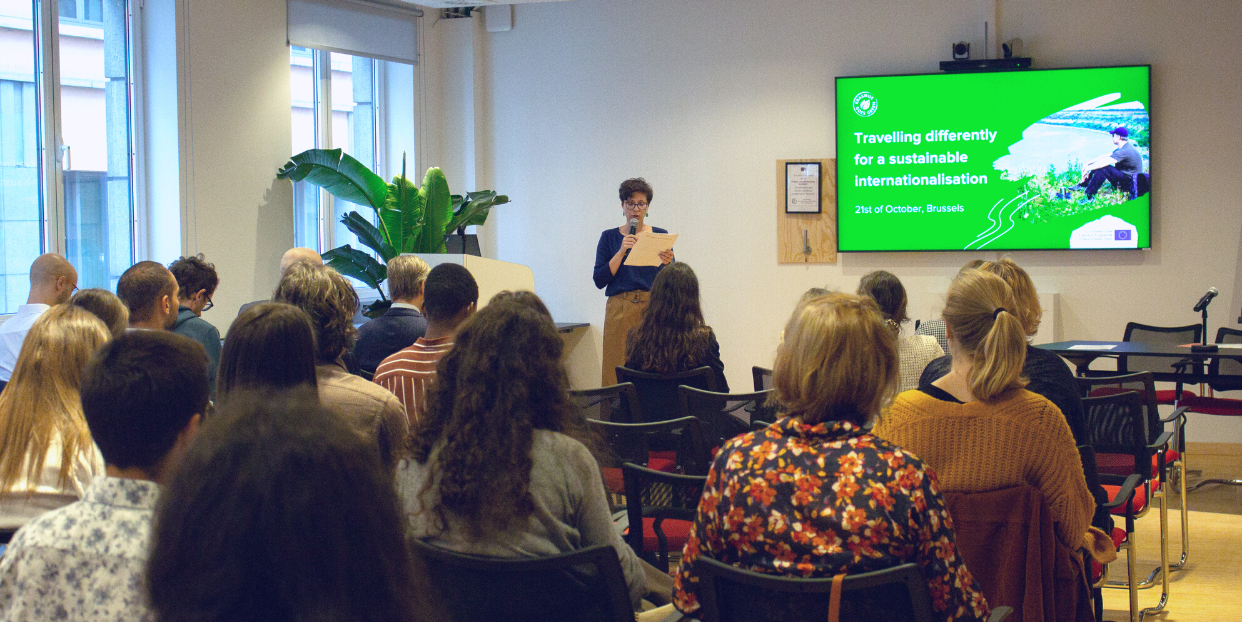
To watch the recorded conference, please click here.
On the 21st of October, Erasmus Student Network hosted a closing conference of the Erasmus Goes Green Project that brought together participants from universities, student organisations, research, national agencies, and EU institutions.
Through a learning and experience-sharing environment, the conference focused on raising awareness about the importance of travelling sustainably, reducing the transport-related carbon footprint of Higher Education (HE) students and staff, presenting the strategies and actors to make passenger transport more sustainable, as well as the individual commitments’ leverage for a climate-friendly Erasmus+.
The Erasmus Goes Green project consortium released an assessment of the transport-related carbon footprint of the Erasmus+ programme, a CO2 visualisation tool, research about the measures to reduce the transport-related carbon footprint of the Erasmus+, Policy Recommendations and Guidelines to reduce the transport-related carbon footprint of Erasmus+, including:
- A handbook for HE students to travel green
- Guidelines for HEIs toward more Sustainable Cooperation
- Policy recommendations

The “Traveling differently for a sustainable internationalisation” conference represented a great opportunity to introduce the project results, bring the related stakeholders together, and stimulate a discussion about sustainability components in Erasmus+.
The conference opened with a presentation by Piotr Gabrielczak from the University of Lodz and Nicolaos Theodossiou from the University of Thessaloniki focused on explaining what are transport-related emissions, why they matter, and what is the importance of calculating them. Their extensive research also visualised the impact of the Erasmus+ on CO2 emissions and encouraged the participants to disseminate the carbon footprint calculator tool and information to support sustainable mobility.
After identifying the transport-related emissions during mobility and their impact on the environment, the Erasmus Goes Green handbook for students ‘’How can students organise their sustainable Erasmus journey?’’ was introduced by Anna Kowalczyk from the Erasmus Student Network. Unfortunately, more than 75% of students of the Erasmus+ programme travel by plane, followed by less popular options, such as trains, buses, or a car. The handbook aims at bridging the attitude-behaviour gap and increases understanding of mobility students’ travel patterns, the environmental impact of Erasmus+, and why and how to avoid plane travel. After increasing the understanding, the Student’s handbook offers useful tools to support students to organise a sustainable trip to their destinations, showing positive stories of mobile students that travelled sustainably and helping them to calculate the CO2 footprint.

To promote sustainable ways of travel but also identify the challenges one has to face during undertaking a long-distance sustainable travel option, Gereon tho Pesch from, Erasmus by Train, Kristina Jentgens from the University of Cologne, and Yasser Haddad from ESN Switzerland shared their experiences and stimulated a discussion while sharing their sustainable travel stories.
The following presentation was dedicated to promoting group travels. Guido Marinolli, CEO of Go2rail focused on identifying the benefits of group travel, such as discounts, sociality, culture discovery, and peer support, among others. Go2rail offers a platform for connecting international students travelling the same route and setting up groups to get ticket discounts for high-speed trains. The founders of the platform have also developed GO2host and GO2places to promote sustainable consumption among students.
Flixbus, represented by Amanda Orza, focused on rethinking bus transport in Europe, including promoting the future of mobility in a collective and green way, shifting from cars and planes to buses and trains. Flixbus has underlined the importance of carbon neutrality and disincentivising fossil fuel and strengthening collective transport as an attractive alternative. Flixbus has promoted a sustainable future of mobility and presented a number of new technologies, such as electric buses, biogas buses, biofuel lines, and hydrogen buses. It is important to mention that Flixbus has been cooperating with Erasmus Student Network and offers special discounts to international students.
Viktoriya Terzieva from European University Foundation introduced the guidelines for HEIs toward more sustainable transnational cooperation. Among the suggested actions, the guidelines mention setting targets to reduce HEIs travel emissions, keeping a record of the Erasmus+ travels, and encouraging staff to improve their transnational partnerships’ carbon efficiency. The guidelines also included actions for staff members participating in transnational partnerships and actions for Erasmus+ coordinators.
The conference participants further explored the global overview and local actions in Europe by the HE practitioners thanks to Evelien Renders from Climate Action Network for International Educators. CANIE accord and travel with CANiE are among the initiatives that the network undertakes to contribute to the carbon-neutral and climate-literate international education sector.
The discussion was enriched by the perspective of the European Commission whose representative, Petra Doderqvist, from DG MOVE, presented the EU initiatives for a sustainable and connected Europe such as the Green Deal, Sustainable and Smart Mobility Strategy, and other flagship initiatives, including digital transformation, to encourage renewable and low-carbon fuels zero emissions, and green urban mobility. During the discussion, attention was also given to the European Union's recovery and other financial packages to promote more sustainable and environment-friendly policies and behaviours.

The event closed with a panel discussion about reducing the transport-related carbon footprint of the Erasmus+ programme, which will inform the Erasmus Goes Green project policy recommendations. The diversity of panellists offered a perfect environment to explore the various perspectives of different stakeholders and players. The panel was moderated by Juan Rayon Gonzalez, President of the Erasmus Student Network, and included the following participants: Marta Gutierrez Benet - from DG EAC, European Commission, Corinne Le Fay‑Souloy from French Erasmus+ Agency and Laetitia Ricklin - AEF-Europe and Marte van der Graaf from Generation Climate Europe. Among other topics, the discussion touched upon the green top-up initiative from the European Commission and the importance of its adjustment to current settings.
Erasmus Student Network is committed to promoting green habits among students and will continue working on encouraging the students and HEIs to capitalize on the deliverables of the Erasmus Goes Green project.

Follow ESN